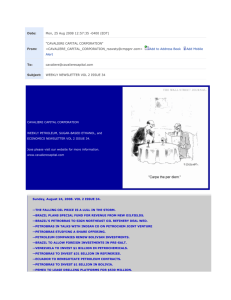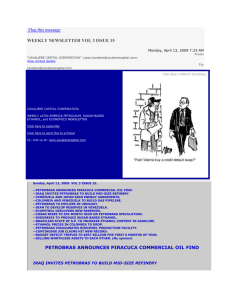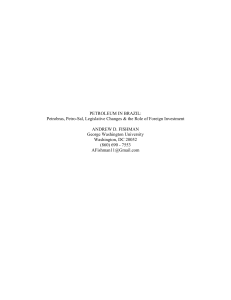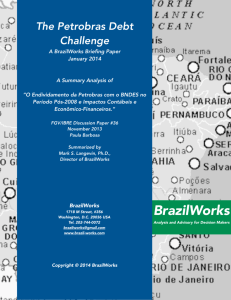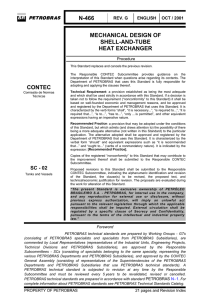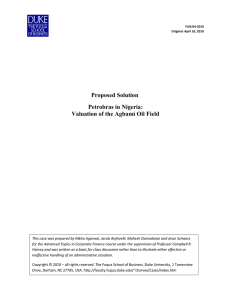petrobras offshore bill FT
advertisement
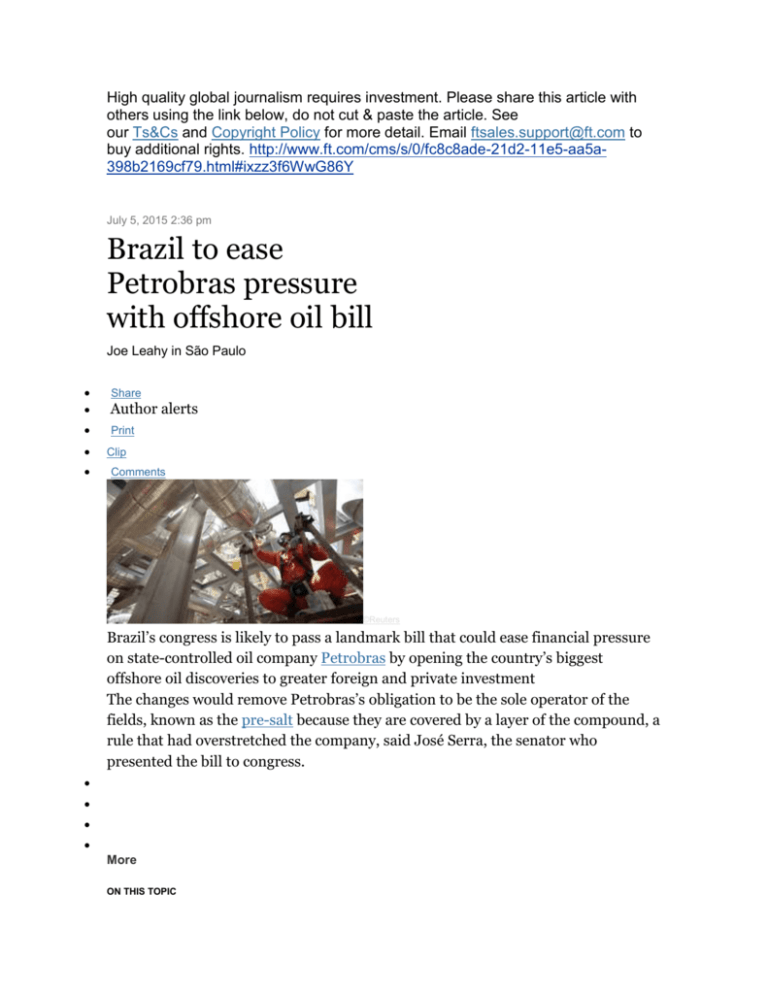
High quality global journalism requires investment. Please share this article with others using the link below, do not cut & paste the article. See our Ts&Cs and Copyright Policy for more detail. Email ftsales.support@ft.com to buy additional rights. http://www.ft.com/cms/s/0/fc8c8ade-21d2-11e5-aa5a398b2169cf79.html#ixzz3f6WwG86Y July 5, 2015 2:36 pm Brazil to ease Petrobras pressure with offshore oil bill Joe Leahy in São Paulo Author alerts Print Share Clip Comments ©Reuters Brazil’s congress is likely to pass a landmark bill that could ease financial pressure on state-controlled oil company Petrobras by opening the country’s biggest offshore oil discoveries to greater foreign and private investment The changes would remove Petrobras’s obligation to be the sole operator of the fields, known as the pre-salt because they are covered by a layer of the compound, a rule that had overstretched the company, said José Serra, the senator who presented the bill to congress. More ON THIS TOPIC Petrobras corruption losses may be larger Comment Petrobras — not well Petrobras chief pledges investor focus Petrobras slashes investment to cut debt IN OIL & GAS Shell set to drill in Arctic this month Week in Review, July 4 BP settlement puts a value on clarity BP settles Deepwater spill for $18.7bn Sign up now FirstFT is our new essential daily email briefing of the best stories from across the web The bill, which now could pass as soon as September, is aimed at stimulating a flood of much-needed investment into one of the world`s most promising oil exploration areas. Oil majors, such as Royal Dutch Shell, which so far have been permitted to participate in the pre-salt only as financial partners to Petrobras, have already indicated their interest in becoming operators should the rule change. Last week Petrobras, which is heavily indebted, said it was scaling back its five-year investment plan by 37 per cent to $130.3bn. “This bill, once passed, will improve Petrobras’ financial performance,” Mr Serra, a member of the centrist opposition PSDB party, told the Financial Times. “At the same time, it will accelerate the development of the pre-salt, which has been in semi-stagnation in recent years.” The bill has gained strength in recent days with support from the leader of the senate, Renan Calheiros, whose PMDB party dominates both houses of congress. Analysts believe it is likely to pass, although probably with an amendment that would give Petrobras the right of first refusal over the operation of pre-salt fields. Eurasia Group said in a note that President Dilma Rousseff of the PT publicly opposed the proposal, but her “ability to block the bill in congress is very limited”. The pre-salt oil finds off Brazil’s southeast coast are believed to contain at least as much oil as the near 60bn barrels in the North Sea. They sparked euphoria when they were discovered in 2007. The government of Brazil’s left-leaning Workers’ Party, or PT, changed the country’s laws governing oil concessions to make Petrobras the sole operator in the pre-salt discoveries. That rule, as well as requirements that the company must take at least a 30 per cent stake in each of the giant fields, have proved burdensome for Petrobras, which has net debt of $106bn, analysts say. In April, Petrobras, which has also been hit by a corruption scandal, announced a write-off of R$51bn in 2014. Adriano Pires, founder of the Brazilian Centre of Infrastructure, said Mr Serra’s bill would speed up the development of the pre-salt by enabling the government to hold real rather than token auctions of exploration blocks to attract greater investment. Under the system in place before the pre-salt, all companies could compete equally in auctions to win concessions to be the operators of exploration blocks. But the pre-salt law made Petrobras the only possible bidder for blocks in that area. As a result, the only pre-salt auction that was held under the new system — for the Libra field in 2013 — had one bidder, a consortium led by Petrobras. “I think given the moment that Brazil is passing, characterised by a deep economic crisis, any bill that will incentivise [private] investment is welcome,” Mr Pires said. Last week, Shell’s Brazil head André Araújo indicated the company’s interest in becoming an operator in the pre-salt area. “Shell always likes to . . . have options, and one of these options is the possibility of being the operator,” he told reporters, adding however that a decision on the regulatory framework was a government matter. RELATED TOPICS Oil Copyright The Financial Times Limited 2015.



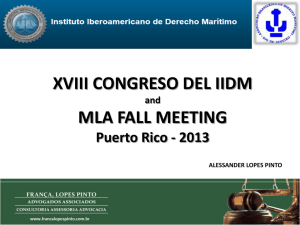

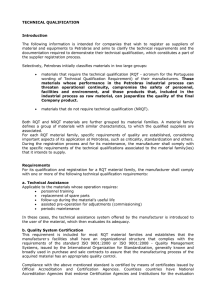

![499-2169-1-PB[85708]](http://s2.studylib.net/store/data/026104304_1-61d73374292838ed564838409be6ff46-300x300.png)
